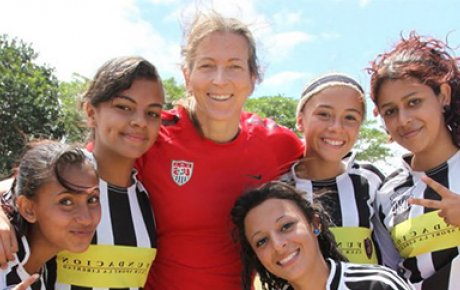Learning
Learning refers to a continuous process of utilizing different sources of data to inform project planning and implementation. As one of the MELI Unit’s six lines of effort, the team promotes a culture of learning within the Bureau to support evidence-informed decision making at ECA.
The MELI Unit promotes a learning culture by bridging two types of learning: strategic and programmatic. Strategic, organization-wide learning pulls data from a wide variety of sources to inform broad, cross-cutting questions that support the mission and operations of ECA, while programmatic learning emphasizes using data to inform decision-making related to specific program activities. MELI not only generates evidence through performance monitoring, partner reporting, evaluations, and pilot initiatives, but also brings teams together to make sense of these data and share learning across stakeholders. We do this through a number of tools – including our Learning Agenda, learning resources, and Evaluation Matters case studies listed below – along with a customer service-oriented focus on the learning needs of ECA’s program teams and senior leaders.
ECA’s Learning Agenda
The Learning Agenda establishes the priority information ECA wants to learn through a set of questions and planned activities intended to answer those questions. It guides ECA in addressing critical knowledge gaps and helps to set strategic knowledge and information priorities, including evaluations and research activities. The current Learning Agenda was developed in 2022, drawing on input across the bureau and in alignment with ECA’s policy priorities reflected in the FY2022 – FY2026 Functional Bureau Strategy. It builds off the 2019 version, developed by MELI following guidance in the Foundations for Evidence-Based Policymaking Act of 2018.
Strategic Learning in Practice
MELI works to answer the Learning Agenda questions on a continuous basis, embedding strategic learning into all aspects of our work. As evidence becomes available – including through evaluations, research projects, MODE data, consultations with stakeholders, etc. – MELI compiles and synthesizes information that can help answer Learning Agenda questions. On a periodic basis, MELI convenes “pause and reflect” sessions with program teams across the bureau as an opportunity for them to review the evidence, discuss what it means in the context of ECA programs, and identify actionable next steps. This helps ensure that the learning MELI shares with the bureau and beyond are appropriately nuanced and grounded in the realities of ECA’s work.
Strategic Learning Resources
- MELI Seminar: Using Data for Learning (Forthcoming)
- MELI Seminar: ECA’s Learning Agenda (YouTube video)
Learning Briefs
When available evidence allows, the MELI Unit creates resources to share learning around specific topics with audiences including our bureau colleagues, implementing partners, posts, other Department of State colleagues, and the public. In addition to the summary briefs, presentations, visuals, and other deliverables, the MELI team may present at ECA’s monthly M&E Community of Practice and at other capacity-building fora.
Learning Briefs
Programmatic Learning from Evaluations
MELI emphasizes learning from evaluations to ensure that ECA is continually improving the effectiveness and efficiency of our programming. Below are examples of programs that utilized evaluation results to modify their programs.
- Evaluation Matters: Community College Administrator Program (CCAP) Evaluation (PDF)
- Evaluation Matters: Alumni TIES Case Study on Learning (PDF)
- Evaluation Matters: Habla Inglés
- Evaluation Matters: CBYX (PDF)
- Evaluation Matters: American Spaces Study on Learning (PDF)
- Evaluation Matters: YSEALI Case Study on Learning (PDF)
- Evaluation Matters: Youth All-Stars Case Study on Learning (PDF)
- Evaluation Matters: AEIF Case Study on Learning (PDF)
- Evaluation Matters: AFCP Case Study on Learning (PDF)
- Evaluation Matters: IWP Case Study on Learning (PDF)
- Evaluation Matters: Humphrey Program Case Study on Learning (PDF)
- Evaluation Matters: YALI Case Study on Learning (PDF)
- Evaluation Matters: NSLI-Y Case Study on Learning (PDF)
- Evaluation Matters: Evaluation Division Assessment (PDF)
- Evaluation Matters: Sports Visitor Program (PDF)
- Evaluation Matters: AWE Case Study on Learning (PDF)
- Evaluation Matters: TechGirls (PDF)
- Evaluation Matters: Career Connections (PDF)
- Monitoring Matters: Youth Welfare Surveys (PDF)
- Evaluation Matters: TechWomen (PDF)

